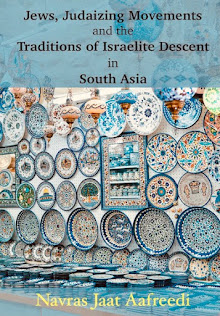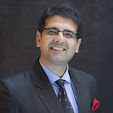5 Towns Jewish Times, July 30, 2012
Hitler is considered a heinous historical by most of humanity, but in the last few years India has been witness to the advent in his popularity.
 Dr. Aafreedi offered a few explanations. Unlike the modern-day neo-Nazis
who idealize Hitler for his racism and persecution of the Jews, Indians
who respect Hitler do so out of misinformation. He believes that this
rise in Hitler’s popularity is not a result of anti-Semitism: “It can be
ascribed to the absence of Jewish Studies in India, where Islamic
Studies are available at almost all major Indian universities. The level
of ignorance among Indians about Jews is hysterical and the state has
been unwilling to introduce Jewish Studies in India, whereas in the
neighboring country China, Jewish Studies are available at ten of its
universities.” He explains that Indians are largely ignorant of the
Holocaust, and those who are “tend to see it as a justified collateral
damage for the greater good of Germany, influenced as they are by the
way Hitler is often projected as a hero by the Hindu right wing,”
Dr. Aafreedi offered a few explanations. Unlike the modern-day neo-Nazis
who idealize Hitler for his racism and persecution of the Jews, Indians
who respect Hitler do so out of misinformation. He believes that this
rise in Hitler’s popularity is not a result of anti-Semitism: “It can be
ascribed to the absence of Jewish Studies in India, where Islamic
Studies are available at almost all major Indian universities. The level
of ignorance among Indians about Jews is hysterical and the state has
been unwilling to introduce Jewish Studies in India, whereas in the
neighboring country China, Jewish Studies are available at ten of its
universities.” He explains that Indians are largely ignorant of the
Holocaust, and those who are “tend to see it as a justified collateral
damage for the greater good of Germany, influenced as they are by the
way Hitler is often projected as a hero by the Hindu right wing,”
Hitler is considered a heinous historical by most of humanity, but in the last few years India has been witness to the advent in his popularity.
Dr. Navras Jaat Aafreedi, an Assistant Professor at the Department of
History & Civilization in Gautam Buddha University in India, is a
scholar of the history of the Jewish communities in India. He has
concluded last month a lecture tour in Israel, during which he gave a
lecture titled “The Rise of Hitler’s Popularity in India” at Tel Aviv
University. He notes that “India is the only country in the world where
Jews have lived with their non-Jewish neighbours in complete harmony for
more than two millennia. Jews are India’s smallest religious minority
and Muslims its biggest, and the two have produced beautiful examples of
amity, unlike anywhere else in the world.”
Hiltler has rapidly gained popularity in India in past years. This
phenomenon is a paradox because of the absence of Anti-Semitism in
India. Yet, though the country has never known anti-Semitism, sales of
Hiltler’s Mein Kampf have risen over 15% in the last decade.
The name “Aryan” is becoming a popular first name in India, and “Hitler”
is the name of the protagonist in many a Bollywood production.
 Dr. Aafreedi offered a few explanations. Unlike the modern-day neo-Nazis
who idealize Hitler for his racism and persecution of the Jews, Indians
who respect Hitler do so out of misinformation. He believes that this
rise in Hitler’s popularity is not a result of anti-Semitism: “It can be
ascribed to the absence of Jewish Studies in India, where Islamic
Studies are available at almost all major Indian universities. The level
of ignorance among Indians about Jews is hysterical and the state has
been unwilling to introduce Jewish Studies in India, whereas in the
neighboring country China, Jewish Studies are available at ten of its
universities.” He explains that Indians are largely ignorant of the
Holocaust, and those who are “tend to see it as a justified collateral
damage for the greater good of Germany, influenced as they are by the
way Hitler is often projected as a hero by the Hindu right wing,”
Dr. Aafreedi offered a few explanations. Unlike the modern-day neo-Nazis
who idealize Hitler for his racism and persecution of the Jews, Indians
who respect Hitler do so out of misinformation. He believes that this
rise in Hitler’s popularity is not a result of anti-Semitism: “It can be
ascribed to the absence of Jewish Studies in India, where Islamic
Studies are available at almost all major Indian universities. The level
of ignorance among Indians about Jews is hysterical and the state has
been unwilling to introduce Jewish Studies in India, whereas in the
neighboring country China, Jewish Studies are available at ten of its
universities.” He explains that Indians are largely ignorant of the
Holocaust, and those who are “tend to see it as a justified collateral
damage for the greater good of Germany, influenced as they are by the
way Hitler is often projected as a hero by the Hindu right wing,”
He observes that “Most of the Indians do not even know about the
Jews, let alone the Holocaust. Among the section of the Indian
population that is aware of the Holocaust, there are many who have
fallen into the trap of the Holocaust deniers and have started either
doubting it as a whole or just its scale.” As part of this
misinformation, many Indians believe that the Axis powers of World War
II were partially responsible for India’s independence from the British
in 1947. It is believed that Hitler’s battle with the Allies forced
Britain to focus their resources in Europe. Britain was unable to
control a territory as large as India, leaving room for an Indian
independence movement. Subhas Chandra Rose, a key figure of the Indian
independence movement, collaborated with Axis powers to raise an army to
fight the British.
Another reason is the younger generation’s great desire for strong
leadership. Dr. Aafreedi thinks they do not have good examples.
Dr. Aafreedi believes that the key to combating this situation is the
dissemination of facts. “I promote Jewish Studies in India, the study
of Jewish history, culture and religion. It is just not possible to
understand the two most widely practiced religions, Christianity and
Islam, without a study of Judaism, oldest of the three Semitic
monotheistic religions. It is important for any nation to appreciate and
recognize the contributions made to it by its religious minorities. If
this does not happen, the society becomes intolerant towards minorities
which has grave consequences not just for the minorities but also for
the majority community. In India, Jews happen to be the smallest
religious minority and the Muslims, the biggest. As a result of their
small numbers, most of the Indians know them only through secondary
sources, which are mostly unreliable, and not as a result of any direct
contact with them. Ignorance gives birth to stereotypes and
misconceptions, and hatred thrives on falsehood. Hence, it becomes very
important to promote Jewish Studies in India. If this is not done, we
would neglect one-sixth of the mankind.”
Hitler’s Mein Kampf is available in almost all Indian
languages, but the only book on the Holocaust in India’s national
language, Hindi, is an FAQ about the Holocaust published by Yad Vashem.
Dr. Aafreedi has worked and continues to work in spreading accurate
information about Judaism and the Holocaust in India. He has organized
cross-cultural and international student dialogues at the University of
Lucknow. There he also invited Jewish authors and filmmakers to speak
about their works and brought a number of Muslim intellectuals to speak
out against anti-Semitism. “I believe that if awareness is created
through the spread of information,” he says, “it can help in eliminating
many misconceptions that people have.”
However, he has met resistance in his work. “Since I started working
as an Assistant Professor, I have designed a number of courses with
Jewish themes embedded in them in a camouflaged manner, as I failed to
get approval for my proposed courses focused on Jewish themes and on the
Shoah. It is hard to get approval for such courses in Indian academia
as the administration fears that it might lose the goodwill of its
political masters if any action of theirs has a detrimental effect on
their political masters’ Muslim votes.” Muslims in India do not know
that Arabs enjoy equality and high standards of living in Israel, and
believe that the mosques on Temple Mount are closed to Muslims because
of Israeli control. Because of such misinformation, Indian political
parties do not make efforts to support Israel likely because of fear
that the large Muslim population will turn against them.
Yet he still finds ways to inform his students of the truth. In a
History of Science and Technology class he once taught to engineering
students, for example, he assigned a paper asking students to analyze
the misuse of technology during the Holocaust. He also introduced a
series of weekly film screenings at the university, where he shows
movies on the Holocaust and other Jewish themes.
“I made a serious effort to eliminate misconceptions and to bring
into sharp focus the Jewish contributions to the world,” he says of his
work. He concluded, stating: “I ask the world to help me in my endeavour
to remove hatred and to promote peace through the spread of knowledge.”
By Jacob Shamsian
Tazpit News Agency

















No comments:
Post a Comment